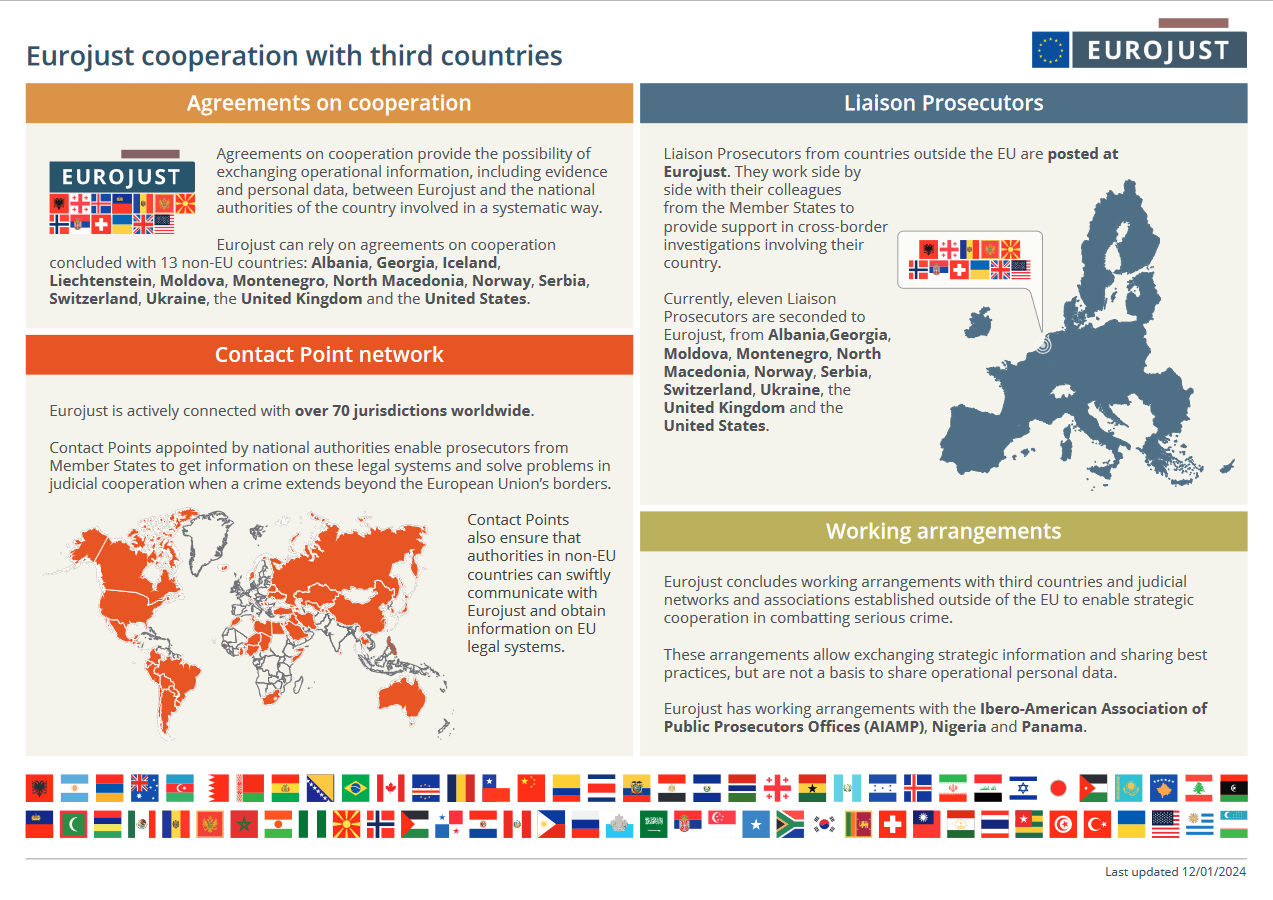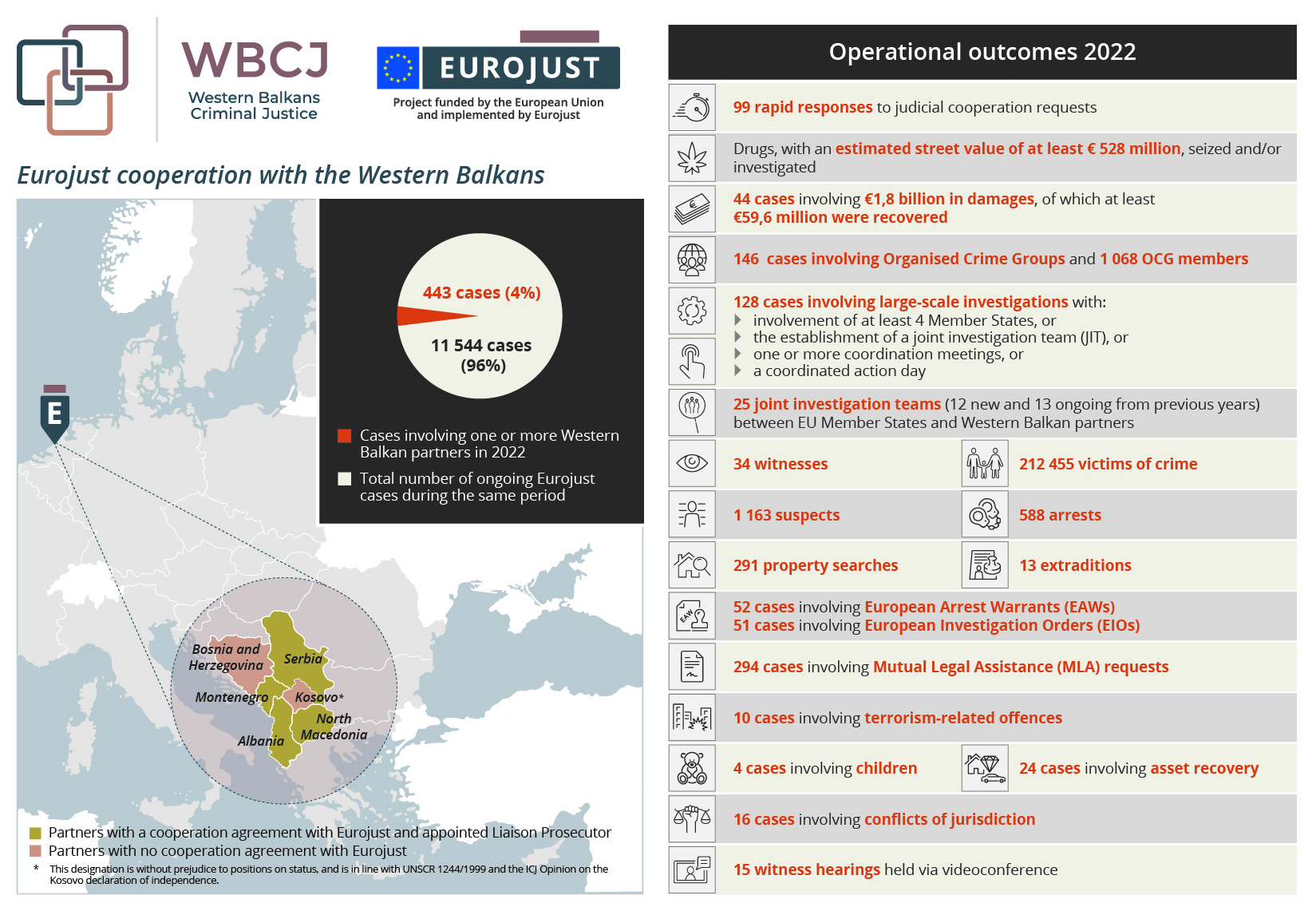Casework involving third countries
Eurojust’s international cooperation continues to lead to an increasing number of registered cases at the Agency, with 331 new cases owned by third countries opened in 2022 alone. Countries with a Liaison Prosecutor located at Eurojust have been requested to participate in cases 569 times in 2022. Moreover, 35 cases have involved countries that concluded a cooperation agreement with Eurojust but have not yet posted a Liaison Prosecutor at the Agency. Countries with appointed Eurojust Contact Points have been requested to participate in 79 cases. The United Kingdom is the third country with the highest casework, with 315 cases in 2022, followed by Switzerland, Norway, Albania, Serbia and Ukraine.
Overview of cases in 2022 involving Liaison Prosecutors
Liaison Prosecutor | Cases initiated by the Liaison Prosecutor | Participation in cases initiated by other Desks | Participation in joint activities/meetings | ||||||
|---|---|---|---|---|---|---|---|---|---|
New in 2022 | Number of countries involved | Ongoing from previous years | New in 2021 | Ongoing from previous years | Coord. meetings | JITs | Action days | ||
2 | 3 or more | ||||||||
Albania | 37 | 37 | 0 | 5 | 48 | 72 | 36 | 18 | 4 |
Georgia | 7 | 6 | 1 | 4 | 16 | 42 | 8 | 2 | 1 |
Montenegro | 12 | 12 | 0 | 12 | 15 | 31 | 1 | 0 | 0 |
North Macedonia | 4 | 3 | 1 | 11 | 21 | 40 | 8 | 0 | 1 |
Norway | 65 | 58 | 7 | 123 | 31 | 83 | 26 | 13 | 0 |
Serbia | 40 | 34 | 6 | 21 | 41 | 79 | 22 | 4 | 1 |
Switzerland | 53 | 45 | 8 | 80 | 141 | 343 | 37 | 21 | 1 |
Ukraine | 20 | 16 | 4 | 49 | 57 | 125 | 36 | 17 | 2 |
United Kingdom | 47 | 41 | 6 | 54 | 268 | 712 | 79 | 29 | 4 |
United States | 6 | 2 | 4 | 5 | 29 | 140 | 33 | 0 | 1 |
Total | 291 | 254 | 37 | 364 | * | * | * | * | * |
* These columns cannot be summed up, since more than one National Desk can be requested to participate in a single case, and coordination meetings and JITs are often co-organised.
Crackdown on criminal network dealing with money laundering and fraud

September 2019 - Suspects allegedly set up companies in Romania and open bank accounts for them from which consistent and successive transfers (estimated at over EUR 70 million) from fraudulent activities are conducted. A case into the OCG suspected of money laundering and fraud is opened at Eurojust.
June 2020 - A JIT is established between Romania and Ukraine, and extended to Italy in June 2021. Eurojust supports the judicial cooperation and coordination of more than 20 countries, hosting 4 coordination meetings and facilitating the execution of many EIOs and requests for MLA.
6 December 2020 - During an action day nine suspects are detained in Romania and one is placed under judicial control. A total of 24 house searches are carried out, 13 in Romania, 7 in the Republic of Moldova and 4 in Sweden. The total value of the seized assets is over EUR 5 million.

International agreements with third countries
In March 2021, the Council adopted a Decision authorising the European Commission to open negotiations on international agreements on cooperation with Eurojust between 13 third countries[1] and the European Union. Negotiations are well advanced with Armenia. As noted in the Commission’s Fifth Progress Report on the implementation of the EU Security Union Strategy published in December 2022, official negotiations have also started with Colombia, Algeria and Lebanon. During 2022, Eurojust has maintained close contact with the Commission services and participated in the negotiation meetings as an observer.
Liaison Prosecutors
Hosting Liaison Prosecutors from non-EU countries at Eurojust’s premises in The Hague allows Member States’ authorities to cooperate closely with the judicial authorities in these countries. This enables direct engagement in operational cooperation between them, leading to more successful investigations and prosecutions.
Currently, 10 third countries have Liaison Prosecutors at Eurojust: Albania, Georgia, Montenegro, North Macedonia, Norway, Serbia, Switzerland, Ukraine, the United States and the United Kingdom. The United Kingdom has had a Liaison Prosecutor at the Agency since 2021 under the EU-UK Trade and Cooperation Agreement, and the Working Arrangement signed with Eurojust in the same year.
Working arrangements with external partners
In August 2022 Eurojust signed a working arrangement with the Iberomerican Association of Public Prosecutors. The purpose of the working arrangement is to encourage and develop cooperation between the parties in combating serious crime that affects the European Union and Latin America, particularly transnational organised crime, drug trafficking, trafficking in human beings, cybercrime and terrorism.
Eurojust’s Contact Points
Since the Agency started operations in 2002, it has been growing its network of Contact Points in third countries, enabling direct contact with the competent authorities in those countries when a crime extends beyond the EU’s borders. To date, the network has Contact Points in over 65 countries.
During 2022, Eurojust’s Contact Point network expanded to include three new third countries: Australia, Bahrain and Morocco. During the year, the Agency began holding regular meetings with Contact Points to better explain the Agency’s role in facilitating judicial cooperation with EU Member States.

Eurojust-supported action leads to arrest of 29 people smugglers in Italy, Greece and Albania

Crime: A network of people smugglers transfers at least 1 100 migrants irregularly to the European Union. The suspects make illegal gains of at least several hundred million euros.
Action: In January 2021, a JIT is set up involving judicial authorities in Italy, Greece and Albania. In preparation for the action day, the authorities carry out long-term surveillance of the suspects, using telephone and online interceptions of evidence and video recordings. This enables them to document the routes used by the network and identify the perpetrators.
Result: During the action day supported by Eurojust, Europol and Frontex, 29 suspects of Albanian, Turkish, Syrian, Iranian, Iraqi and Pakistani origin are arrested in Italy, Greece and Albania. Eight of them are arrested during an ongoing smuggling operation, and the migrants involved are brought to safety.
Eurojust's role: In addition to supporting the JIT, Eurojust sets up a coordination centre during the action day and provides cross-border judicial support via the Agency’s Italian and Greek National Desks, and the Liaison Prosecutor for Albania.

Cooperating with regions around the world through projects
South Partner Countries (SPCs)
Eurojust’s growing role and increasing involvement with the SPCs continued in 2022 with the further implementation of the EuroMed Justice Programme (2020–2023). Eurojust supported the development of practical tools for facilitating cross-border judicial cooperation, designed by the EuroMed Justice Group of Experts to provide up-to-date information and tools for criminal justice practitioners. In 2022, an updated EuroMed Digital Evidence Manual was published. The guide explains the conditions needed to identify and overcome the practical and legal obstacles in gathering electronic evidence.
In October 2022, the European Judicial Network Secretariat became a member of EMJNet, the network of Contact Points for criminal justice authorities from SPCs and EU Member States. During 2022, Eurojust and the European Judicial Network (EJN) Secretariat contributed to the work of the EMJNet, and provided guidance for the implementation of the 2022–25 cross-Mediterranean strategies.
In October 2022, the 4th EuroMed Forum of Prosecutors General brought together high-level public prosecution officials from all SPCs and EU Member States at the Eurojust premises. The Forum assessed the progress made to date and discussed the next steps for the implementation of the 2022–2025 Strategy, including the Action Plans on migrant smuggling, confiscation of crime proceeds and asset recovery. During the event, seven high-level meetings with SPC delegations (with the participation of representatives of the European Commission) took place to discuss the international agreements between the European Union and SPCs for Eurojust.
In 2022, several conferences were organised gathering criminal justice practitioners and experts from the SPCs and EU Member States. In Athens in May 2022, in coordination with the Greek Ministry of Justice, a conference took place where operational experiences and best practices on preventing, investigating and prosecuting migrant smuggling offences were shared. In the same month in Lyon, in close coordination with the French Ministry of Justice, a conference was held to help judicial and law enforcement authorities apply data protection standards when gathering cross-border electronic evidence in criminal matters. In Tunisia in June 2022, the first Mediterranean conference took place dedicated to environmental justice, where Algeria, France and Tunisia shared good practices for the more effective application of environmental law. The conference explored the development of a network of magistrates specialised in environmental law on both sides of the Mediterranean Sea.
Additionally, the National Institute of Magistracy in Bucharest and the Belgian Judicial Training Institute co-hosted two round tables to share practices on the development of cross-Mediterranean curricula on international judicial cooperation in criminal matters.
Western Balkans Criminal Justice Project[2]
In September 2022, Eurojust began work on the WBCJ project, funded by the EU Instrument of Pre-accession Assistance. The project’s main aim is to strengthen cooperation within the Western Balkans[3] and between the region and the European Union on fighting organised crime and terrorism using modern tools and instruments. This will lead to an enhanced level of interaction and integration between the European Union and the Western Balkan region in the criminal justice field.
The Western Balkan region has long been an important ally of Eurojust in the fight against cross-border organised crime. By hosting this project, we are stepping up existing efforts and helping to overcome any remaining hurdles to judicial cooperation amongst the Western Balkan partners and between them and EU Member States. Our aim is to build long-term, structural partnerships that will result in even greater operational results.
Between October and December 2022, Eurojust’s President and Vice-Presidents visited the six Western Balkan partners to introduce the project to the participating authorities. The Western Balkan partners appointed their respective members of the contact group, which will be responsible for identifying common cases that would benefit from coordination. These selected cases will receive financial support and expert advice from Eurojust to facilitate coordinated parallel investigations and prosecutions, and JITs.

Cooperation with Latin America
In the framework of the EL PAcCTO project fostering closer dialogue with Latin America, Eurojust developed a guide on cooperation with Eurojust Contact Points in the region. The guide was disseminated to all Contact Points in July 2022 in both Spanish and English. Meetings between Eurojust representatives and Latin American Contact Points are envisaged to discuss the implementation of the guide.
Eurojust participated to the EL PAcCTO event in Buenos Aires in November 2022 to discuss cooperation between the Agency and Latin American Contact Points and share the latest updates regarding Eurojust’s support to JITs.
[1] Algeria, Argentina, Armenia, Bosnia and Herzegovina, Brazil, Colombia, Egypt, Israel, Jordan, Lebanon, Morocco, Tunisia and Türkiye
[2] This project is also referred to as WB CRIM JUST.
[3] Including Albania, Bosnia and Herzegovina, Kosovo*, North Macedonia, Montenegro and Serbia.
*This designation is without prejudice to positions on status, and is in line with UNSC 1244 and the ICJ Opinion on the Kosovo Declaration of Independence.
